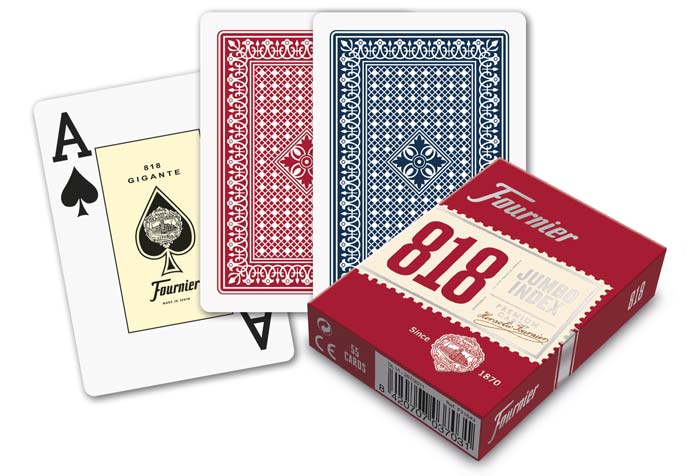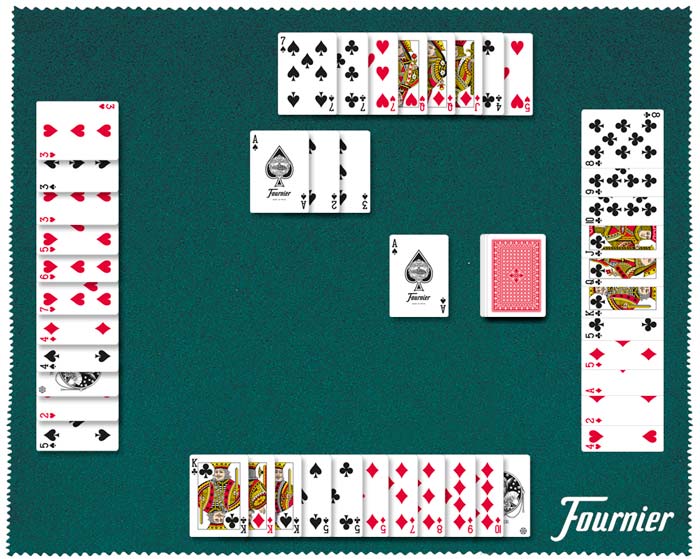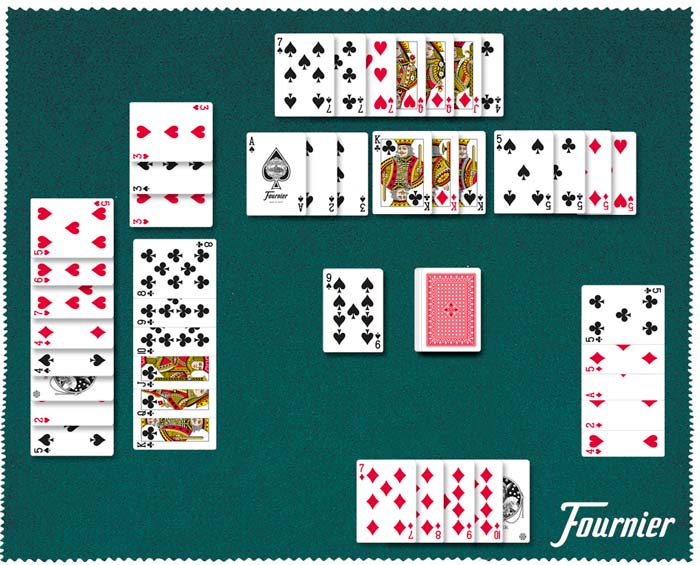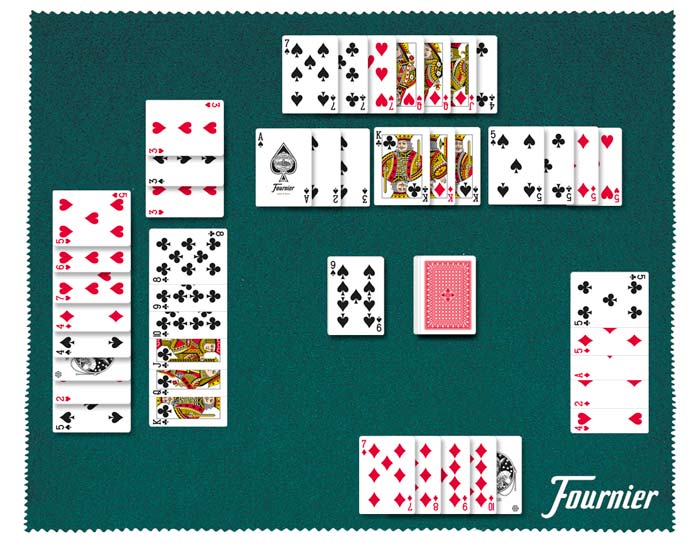Pinochle is one of Spain’s most popular games.
It consists of discarding the cards held by placing them face up on the table to meld combinations of at least three cards and reach the minimum 1,500 points required to win the game before your opponents during several partial games.
It is played using two 52 card English decks plus the two jokers in each deck, which are used to supplement or represent any other card that is missing in a combination. Added to which, the eight deuces are used the same as the jokers.
It can be played by two or more players, individually or in pairs, although the latter is more interesting and varied because players can share the cards they have in common and score for both players in one single hand. The rules for which are explained below.
The value is the same for any of the four suits.
| Wild card | 30 Points |
| Deuce | 15 Points |
| Ace | 15 Points |
| K, Q, J, 10, 9 & 8 | 10 Points |
| 7, 6, 5, 4 & 3 | 5 Points |
Both decks are spread out on the table and each player takes a card. The two players with the highest cards play against the two players with the lowest cards. Whoever drew the highest card is the “hand”, with their partner sitting opposite them and the opposing player who drew their highest card sitting on their right.
The player preceding in turn to the “hand”, shuffles the cards and gives them to the “hand”’s partner to cut, who should ensure that the number of cards left after cutting are sufficient to give each player eleven cards plus one that will be placed face up on the table. This card has a bonus score of 50 points. The dealer deals out the cards one by one in an anti-clockwise direction.
The “hand” starts by choosing to take either the top card off the deck or the upturned card on the table. If the player has melded a combination in their hand they can choose to show it, ending their turn by discarding a card, which is left face up on the table. The game continues, strictly from left to right, and each player in turn must take the top card off the deck or the discards that are left face up on the table, bearing in mind that they have to take all of the discards, even if they are only interested in one of them.
Next, the player shows their cards in minimum combinations of three cards, either in sets of equal cards or in straights, using as many wild cards as they please or adding cards to the their partner’s previous melds. Showing cards or combinations is not obligatory, it can be done in a later turn when more advantageous. The turn ends by having to discard a card. This discard is always done using a card being held, never with one already face up on the table.
The cards must be place face up on the table in front of only one of the team, since the game is common to both, and in such a way that all the card numbers are visible so that the melds, especially straights, are clearly visible.
Any player can end and win a hand in their turn when they get rid of all the cards in their hand, placing them face up on the table in one or more combinations or adding them to those already on show.
If the player still has one card left, they can also end the game by discarding it. Folding is finishing a partial game by showing all the cards in a hand at once. If this is done in the first turn of the game, it is called “Folding the hand”, i the hope that it makes it easier for their partner to play all of their cards.
When, after discarding, a player only has one card left in their hand, they must warn both their partner and the opposing players that they are about to finish by saying “Pumba” out loud. When a player says “Pumba” and there is only one discard left on the table, they cannot take it to finish the game, there must be at least two discards on the table; so in this case they will have to take a card from the stock deck. A partial game can also end because there are no cards left in the stock deck, although this very rarely happens.
Only two different combinations can be made, cards of the same rank or straights of the same suit:
Because deuces are wild cards they do not represent their own value. The value of the wild cards that are placed at the ends of a full straight can be rescued by taking the card that they represent, placing the rescued card crossways in the straight so that they can be seen when assessing the final score. However, wild cards that are inside the straight will not be able to change position, which is why they are usually called “Blocked Wild Cards”.
A Clean Straight is one that does not contain any wild cards, a Semi-clean Straight is one that has one or both jokers or deuces of the same suit and a Dirty Straight is one that contains a wild card or deuces of a different suit. It is no possible to join two straights on the table, even if they are the same suit.
A player or couple is said to have Barbele when, at the end of a partial game, their score reaches or exceeds 750 points. Having Barbele makes it difficult for players who have reached the said score to meld their initial cards for each partial game, since they must have a meld with a minimum value of 70 points in order to be able to display cards for the first time.
If one of the partners has displayed cards on the table opening the game, their partner may, in turn, display their melds or add cards to the melds already shown, without having to comply with this opening requirement.
A match consists of as many partial games necessary for one of the couples to reach or surpass 1,500 points, with the first team to reach this score winning the match. There are players who prefer to limit a match to eight partial games, with the couple who gets the highest score winning the match.
The value of each partial game can be positive or negative. Because each pair play their hand together, the score is common to both. At the end of each partial game, the melds for both companions are joined together in order to work out the score. The value of the special melds played, the value of the ordinary melds played and the value of the bonuses won are all added together to give a total. The value of unplayed cards still held and the exit penalty are then subtracted from this total.
Once a score has been accepted and noted, it cannot be disputed. The scores obtained in each partial game are added up, and when at the end of a partial game a couple exceeds the score for the match, the difference with the score obtained by the opposing players is then determined, settling the score that has been previously agreed.
By way of bonuses, a player can score the following points:
| Exact cut | 50 Points |
| Eight cards of the same rank with no wild card, that are neither figure cards or aces, add to the value. | 50 Points |
| Finish a partial game | 20 Points |
| Finish a partial game with all red or all black cards | 1000 Points |
| Finish with cards that are only aces, figure cards or wild cards. | 1000 Points |
| Finish with cards that are neitheraces or figure cards | 1000 Points |
The player who makes any of the following special melds, will score the following points:
| Pinochle with the initial cards | 3000 Points |
| Pinochle during the game | 1500 Points |
| Clean straight | |
| Semi-clean straight with a wild card or deuce of the same suit | 1000 Points |
| Semi-clean straight with 2 wild cards or deuces of the same suit | 750 Points |
| Dirty straight | 500 Points |
| 8 natural aces | 1000 Points |
| 8 natural figure cards | 750 Points |
| 7 natural aces | 400 Points |
| 7 natural figure cards | 300 Points |
| 6 natural aces | 300 Points |
| 6 natural figure cards | 200 Points |
| 6 aces with a wild card | 180 Points |
| 6 figure cards with a wild card | 120 Points |
* Without relying on cards played by their partner
In all of these melds the intrinsic value of the cards that form is not added, however, the value of the rescued wilds cards is.
The value of the wild cards in a meld can be rescued by taking the natural card that they represent. In a set of equal cards, the total value of the meld increases by 30 points for each wild card that is rescued, and for every two that are rescued the value of the meld increases by double the value of the card that it represents. In straights, the total value of the straight increases by 30 points for each wild card that is rescued, and for every two that are rescued, the total value of the straight increases by 15 points.
With regard to penalties, 50 points are deducted from a player’s score when they try to make their first meld while having Barbele, but without having the required card value.
There are also three melds that increase the intrinsic value of the cards. The value of the cards is doubled by folding a hand containing a wild card, relying on cards already played by their partner. The value of the cards is also doubled by finishing without a wild card during the course of the game, relying on cards already played by their partner if they have not played a wild card.
The value of the cards is quadrupled by folding the hand without a wild card. In this case, they can also rely on their partner’s cards as long as their partner has not played any wild cards.
The 20 bonus points for finishing a partial game do not count in the first or third partial game. These 20 bonus points are awarded for the second partial game.
If you wish to receive the latest news from Fournier in your email
Sign up!
Are you a distributor, collector, card fan, professional player? At Fournier we have the best exclusive information from within the sector, personalized to suit your interests.
Sign up!


